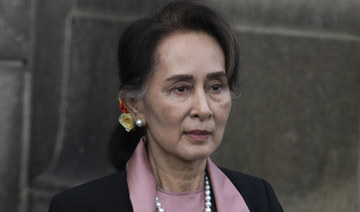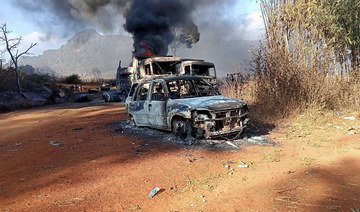BANGKOK: A court in Myanmar sentenced ousted leader Aung San Suu Kyi to four more years in prison on Monday after finding her guilty of illegally importing and possessing walkie-talkies and violating coronavirus restrictions, a legal official said.
Suu Kyi was convicted last month on two other charges and given a four-year prison sentence, which was then halved by the head of the military-installed government.
The cases are among about a dozen brought against the 76-year-old Nobel Peace Prize laureate since the army seized power last February, ousting her elected government and arresting top members of her National League for Democracy party.
If found guilty of all the charges, she could be sentenced to more than 100 years in prison.
Suu Kyi’s supporters and independent analysts say the charges against her are contrived to legitimize the military’s seizure of power and prevent her from returning to politics.
The United Nations called again for the release of Suu Kyi and all those detained arbitrarily since last February’s coup.
“All political prisoners must be released, and clearly, this is not a step in the right direction,” UN spookesman Stephane Dujarric told reporters at UN headquarters in New York.
Monday’s verdict in the court in the capital, Naypyitaw, was conveyed by a legal official who insisted on anonymity for fear of being punished by the authorities, who have restricted the release of information about Suu Kyi’s trials.
He said she was sentenced to two years in prison under the Export-Import Law for importing the walkie-talkies and one year under the Telecommunications Law for possessing them. The sentences are to be served concurrently. She also received a two-year sentence under the Natural Disaster Management Law for allegedly violating coronavirus rules while campaigning.
Suu Kyi was convicted last month on two other charges — incitement and breaching COVID-19 restrictions — and sentenced to four years’ imprisonment. Hours after that sentence was issued, the head of the military-installed government, Senior Gen. Min Aung Hlaing, reduced it by half.
Suu Kyi’s party won a landslide victory in a 2020 general election, but the military claimed there was widespread electoral fraud, an assertion that independent poll watchers doubt.
Since her first guilty verdict, Suu Kyi has been attending court hearings in prison clothes — a white top and a brown longyi skirt provided by the authorities. She is being held by the military at an unknown location, where state television reported last month she would serve her sentence.
The hearings are closed to the media and spectators and the prosecutors do not comment. Her lawyers, who had been a source of information on the proceedings, were served with gag orders in October.
The military-installed government has not allowed any outside party to meet with Suu Kyi since it seized power, despite international pressure for talks including her that could ease the country’s violent political crisis.
It would not allow a special envoy from the Association of Southeast Asian Nations, of which Myanmar is a member, to meet her. The refusal received a rare rebuke from fellow members, who barred Min Aung Hlaing from attending its annual summit meeting.
Even Cambodian Prime Minister Hun Sen, who took over as the regional group’s chair for this year and advocates engagement with the ruling generals, failed to meet her last week when he became the first head of government to visit Myanmar since the army’s takeover.
The military’s seizure of power was quickly met by nonviolent nationwide demonstrations, which security forces quashed with deadly force, killing over 1,400 civilians, according to a detailed list compiled by the Assistance Association for Political Prisoners.
Peaceful protests have continued, but amid the severe crackdown, an armed resistance has also grown, to the point that UN experts have warned the country could be sliding into civil war.
“The Myanmar junta’s courtroom circus of secret proceedings on bogus charges is all about steadily piling up more convictions against Aung San Suu Kyi so that she will remain in prison indefinitely. Senior Gen. Min Aung Hlaing and the junta leaders obviously still view her as a paramount political threat who needs to be permanently neutralized,” said Phil Robertson, deputy Asia director for Human Rights Watch.
“Once again, Aung San Suu Kyi has become a symbol of what is happening to her country and returned to the role of political hostage of military hell-bent on controlling power by using intimidation and violence,” Robertson said in a statement. “Fortunately for her and the future of Myanmar, the Myanmar people’s movement has grown well beyond just the leadership of one woman, and one political party.”
Suu Kyi was charged right after the military’s takeover with having improperly imported the walkie-talkies, which served as the initial justification for her continued detention. A second charge of illegally possessing the radios was filed the following month.
The radios were seized from the entrance gate of her residence and the barracks of her bodyguards during a search on Feb. 1, the day she was arrested.
Suu Kyi’s lawyers argued that the radios were not in her personal possession and were legitimately used to help provide for her security, but the court declined to dismiss the charges.
She was charged with two counts of violating coronavirus restrictions during campaigning for the 2020 election. She was found guilty on the first count last month.
She is also being tried by the same court on five counts of corruption. The maximum penalty for each count is 15 years in prison and a fine. A sixth corruption charge against her and ousted President Win Myint in connection with granting permits to rent and buy a helicopter has not yet gone to trial.
In separate proceedings, she is accused of violating the Official Secrets Act, which carries a maximum sentence of 14 years.
Additional charges were also added by Myanmar’s election commission against Suu Kyi and 15 other politicians in November for alleged fraud in the 2020 election. The charges by the military-appointed Union Election Commission could result in Suu Kyi’s party being dissolved and unable to participate in a new election the military has promised will take place within two years of its takeover.
Myanmar’s Suu Kyi sentenced to 4 more years in prison
https://arab.news/j4jaa
Myanmar’s Suu Kyi sentenced to 4 more years in prison
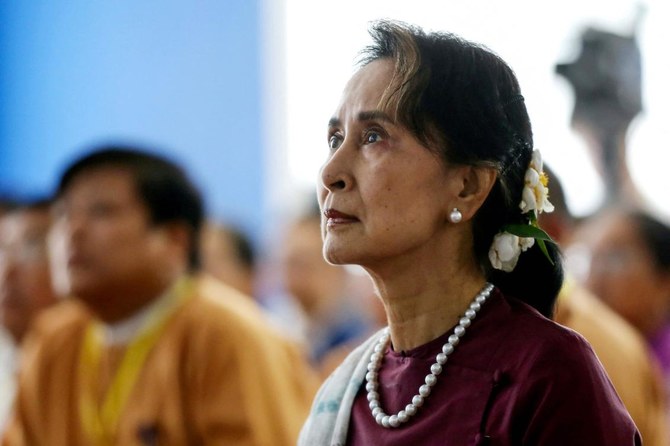
- The Nobel laureate has been detained since February 1 when her government was forced out in an early morning coup
- Monday’s sentence adds to the penalties the court handed down in December when she was jailed for four years for incitement and breaching Covid-19 rules while campaigning
Philippines seeks to position itself as top tourism destination at Arabian Travel Market
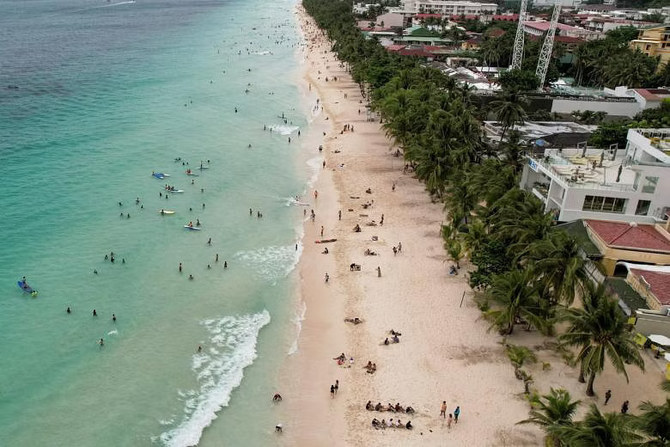
- Philippines has recorded 10 percent increase in visitors arriving from Gulf countries this year
- The country wants to become a preferred destination in Asia and the world
MANILA: The Philippines is working to attract more visitors from the Middle East and position itself as a preferred destination for international travelers, its tourism stakeholders said ahead of the Arabian Travel Market in Dubai.
More than 2,300 exhibitors and delegates from over 165 countries are joining the annual Arabian Travel Market, which this year will take place from May 6 to 9 at the Dubai World Trade Center.
In the Philippines, known for its white sandy beaches, diving spots and diverse culture, tourism is a key sector, contributing nearly 13 percent, or about $44 billion, to its gross domestic product in 2019.
The Department of Tourism will be leading the Philippine delegation in Dubai, as officials set their eyes on promoting the country’s best tourism to the international market.
“We look forward to these opportunities to share the Filipino story to the rest of the world … and to reinforce the Philippines’ position as a preferred destination and top-of-mind choice for travelers,” Secretary of Tourism Christina Garcia Frasco said in a statement.
With its participation at the Arabian Travel Market, the Philippines hopes to sustain the momentum from increased tourist arrivals from the Middle East, she added.
The Philippine tourism industry will not only promote their strengths, such as their tropical and natural attractions, but also diverse offerings in gastronomy and culture, as well as the Filipino tourism workers, “who serve as our best asset for their distinct hospitality and warmth,” Frasco said.
The Philippines has welcomed more 2 million international travelers since the beginning of the year, according to data from the tourism department. This includes a 10 percent increase in visitors arriving from Gulf countries, especially Saudi Arabia and the UAE, which has been among the Philippine government’s key emerging-market targets.
“There’s been a remarkable surge in outbound tourism from the Middle East, particularly from Gulf Cooperation Council countries … We see a growing appetite for international travel among GCC citizens and we see this trend continuing to rise in the coming years,” said Maria Margarita Montemayor Nograles, chief operating officer of the Tourism Promotions Board.
“This is one of the major reasons why we are doubling down on our efforts to maintain and enhance our presence in the Middle East. With our continued participation at the ATM, we aim to position the Philippines as a top-of-mind destination in Asia.”
Tourists from the Middle East are growing more important for some Filipino tourism operators, and represent a significant segment of their clientele, said Manih Karay, president of CTPH Tour.
“To appeal to tourists from Arab countries and promote the Philippines, we highlight the country’s natural beauty, rich cultural heritage, and warm hospitality … Their interest in exploring new destinations and cultural experiences aligns well with our commitment to providing inclusive and diverse travel services,” Karay told Arab News.
Arab tourists also contribute to the growth of the Philippines’ tourism industry, Karay said, adding that they foster cultural exchange and economic development.
“Their visits not only enrich our travel experiences but also promote mutual understanding and appreciation among different cultures,” she said.
Suspected Kashmir rebels kill Indian air force corporal
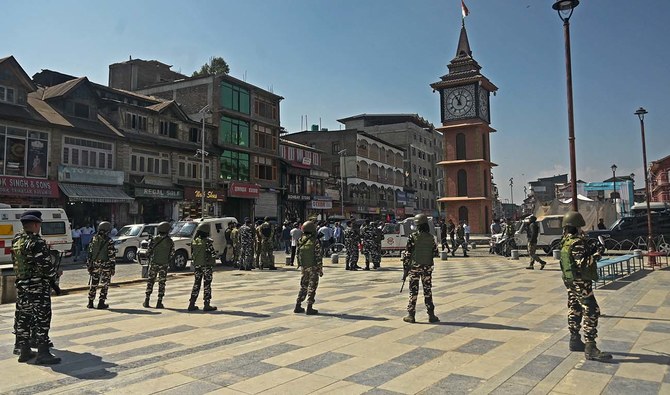
- Suspected rebels ambushed military convoy in Indian-administered Kashmir, Indian Air Force says
- Since 1989, rebel groups opposed to Indian rule have waged insurgency in disputed territory
SRINAGAR, India: An Indian air force member was killed and four more injured when suspected rebels ambushed a military convoy in Indian-administered Kashmir, an official statement said, as campaigning for national elections continues in the disputed territory.
The convoy was attacked by an unknown number of armed militants who sprayed automatic rifle fire toward at least one air force truck in the mountainous Poonch area, 200 kilometers (124 miles) south of the main city of Srinagar, the air force said in a statement.
Five air force personnel were hit in the firefight late Saturday and “one Air Warrior succumbed to his injuries later,” it said, identifying the dead man as a corporal.
A neighboring constituency took part in the first phase of India’s general election on April 19, and Poonch voters were originally scheduled to cast their ballots this week but the Election Commission of India has postponed the polling to May 25 because of inclement weather in recent days.
Kashmir has been divided between India and Pakistan since their independence in 1947, with both claiming the high-altitude territory in full but administering it in parts.
Since 1989, rebel groups opposed to Indian rule have waged an insurgency in Indian-controlled Kashmir, demanding either independence or a merger with Pakistan.
The conflict has left tens of thousands of civilians, soldiers and militants dead.
Rebel activity in the territory has registered an uptick since last month as campaigning for the elections picked up in the restive region.
In April, three suspected rebels were killed and a police officer and three soldiers wounded in three separate clashes across the territory.
Violence has drastically dropped since 2019, when Prime Minister Narendra Modi’s government revoked the region’s limited autonomy and stepped up a security chokehold.
Voting in India’s six-week-long national election, which started last month, will end on June 1.
Driver dies after crashing into White House perimeter gate, Secret Service says

- The driver was not immediately identified
WASHINGTON: A driver died after crashing a vehicle into a gate at the White House Saturday night, authorities said.
The driver was found dead in the vehicle following the crash shortly before 10:30 p.m. at an outer perimeter gate of the White House complex, the US Secret Service said in a statement.
Security protocols were implemented but there was no threat to the White House, the agency said.
The driver was not immediately identified.
The Secret Service will continue to investigate the matter, while turning over the fatal crash portion of the investigation to the Washington Metropolitan Police Department, the agency said.
Fake videos of Modi aides trigger political showdown in India election

- Indian police arrest nine people for circulating fake video of Indian Home Minister Amit Shah
- With more than 800 million Internet users, tackling misinformation in India is a huge challenge
BENGALURU/LUCKNOW: Manipulated videos are taking center stage as campaigning heats up in India’s election, with fake clips involving two top aides of Prime Minister Narendra Modi triggering police investigations and the arrest of some workers of his rival Congress party.
In what has been dubbed as India’s first AI election, Modi said last week fake voices were being used to purportedly show leaders making “statements that we have never even thought of,” calling it a conspiracy “to create tension in society.”
Indian police — already investigating the spread of fake videos showing Bollywood actors criticizing Modi — are now investigating a doctored online clip that showed federal home minister Amit Shah saying the ruling Bharatiya Janata Party will stop certain social guarantees for minorities, a subject sensitive for millions of voters.
Shah retorted on X, posting his “original” and the edited “fake” speech and alleging — without providing any evidence — that the main opposition Congress was behind the video it created to mislead the public. The minister said “directions have been issued to the police to address this issue.”
Indian police arrested at least nine people, including six members of Congress’ social media teams, in the states of Assam, Gujarat, Telangana and New Delhi last week for circulating the fake video, according to police statements.
Five of the Congress workers were released on bail, but the most high-profile arrest made by the cybercrime unit of New Delhi police came on Friday, when they detained a Congress national social media coordinator, Arun Reddy, for sharing the video. New Delhi is one region where Shah’s ministry directly controls police. Reddy has been sent into three-day custody.
The arrest has sparked protests from Congress workers with many posting on X using the #ReleaseArunReddy tag. Congress lawmaker Manickam Tagore said the arrest was an example of “authoritarian misuse of power by the regime.”
Congress’ head of social media, Supriya Shrinate, did not respond to messages and an email seeking comment.
MISINFORMATION
India’s election from April 19 to June 1 will be the world’s largest democratic event. With nearly a billion voters and more than 800 million Internet users, tackling the spread of misinformation is a high stakes job. It involves round-the-clock monitoring by police and election officials who often issue take down orders to Facebook and X as investigations start.
In India’s most populous state of Uttar Pradesh, more than 500 people keep tabs on online content, flagging controversial posts and coordinating with social media companies for their removal when needed, police chief Prashant Kumar told Reuters on Saturday.
Another fake video that sparked a storm last week showed Yogi Adityanath, the state’s chief minister, criticizing Modi for not doing enough for families of those who died in a 2019 militant attack. Though fact checkers said the video was created using different parts of an original clip, state police called it an “AI generated, deepfake.”
Using Internet address tracking, state police arrested a man named Shyam Gupta on May 2 who had shared the fake video post on X a day earlier, receiving over 3,000 views and 11 likes.
The police have accused Gupta of forgery and promoting enmity under Indian law provisions that can carry a jail term of up to seven years if convicted. Reuters could not reach him as he is currently serving a 14-day custody period.
“This person is not a tech guy. Had he been tech savvy, arresting him quickly would not have been possible,” said police officer Kumar.
Australian police shoot boy dead after stabbing with ‘hallmarks’ of terrorism

SYDNEY,: Australian police said on Sunday they had shot dead a boy after he stabbed a man in Western Australia’s capital Perth, in an attack authorities said indicated terrorism.
There were signs the 16-year-old, armed with a kitchen knife, had been radicalized online, state authorities said, adding they received calls from concerned members of the local Muslim community before the attack, which occurred late on Saturday night.
The attack, in the suburb of Willetton, had “hallmarks” of terrorism but was yet to be declared a terrorist act, police said.
“At this stage it appears that he acted solely and alone,” Western Australia Premier Roger Cook told a televised press conference in the state capital Perth, regarding the attacker.
The victim, stabbed in the back, was stable in hospital, authorities said.
Prime Minister Anthony Albanese said he had been briefed on the incident by police and intelligence agencies, which advised there was no ongoing threat.
“We are a peace-loving nation and there is no place for violent extremism in Australia,” Albanese said on social media platform X.
The incident comes after New South Wales police last month charged several boys with terrorism-related offenses in investigations following the stabbing of an Assyrian Christian bishop while he was giving a live-streamed sermon in Sydney, on April 15.
The attack on the bishop came only days after a stabbing spree killed six in the Sydney beachside suburb of Bondi.
Gun and knife crime is rare in Australia, which consistently ranks among the safest countries in the world, according to the federal government. (Reporting by Sam McKeith in Sydney; Editing by Christian Schmollinger and William Mallard)



